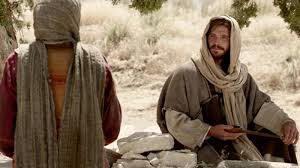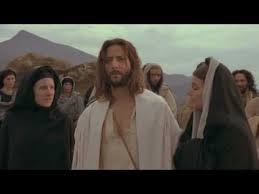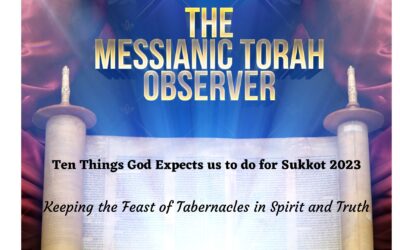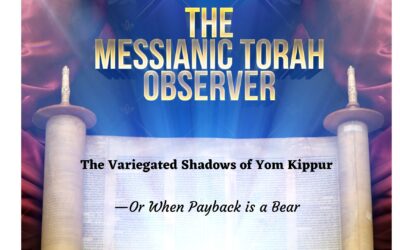Compassion and Yeshua Messiah
Part 2 of my Divinity of Yeshua Messiah Series–Sabbath Thoughts and Reflections Episode 73
In this episode of Sabbath Thoughts and Reflections, I wish to examine the the Godly attribute of Compassion and Yeshua Messiah.
This topic stems from our last Shabbat Fellowship gathering here in Southern California, we discussed the story of Master raising Lazarus from the dead. This story is only found in John’s Gospel account, chapter 11, verses 1 through 53.
We’ve all heard and no doubt read this beautiful story countless times in the course of our individual journeys. Yet living and existing in the realm of Hebrew Roots for the last eleven or so years, the story had become nothing more than a story to me and quite frankly just another proof that Master Yeshua was the Son of Yahweh. But this particular reading of the account for some reason captured my attention and somehow resonated with me more than it ever has.
The Human Condition and Yeshua HaMaschiyach
This time I began to see how Master dealt with the human condition and how the human condition directly affected Him as a man sent from the Creator on a covert mission to redeem us from eternal destruction and to restore the broken relationship between us and Father. I guess for me, I always saw Master as a supernatural Being who was impervious to the effects of the human condition. After all, most of us have been indoctrinated through years of false being “churched” to identify Master Yahoshua as Yahweh and Yahweh as Yahoshua; one in the same Beings. Sure we speak of the love that Yeshua had for us mere mortals, but when it came down to really understanding just who Master was, is and who He is to become in the World Tomorrow, I think we tend to fall short in our understanding of the man.
Yeshua Messiah as Some Type of God-Man
The various creeds of the Universal Church over the course of the last two millennia have conditioned us to view Master Yahoshua as some type of God-Man. And what does a God-Man look like in terms of His abilities and disposition? Well, we are trained to see Him as some type of super being with supernatural attributes and abilities. We as mere mortals, suffering from the frailties of the human condition, can only reach out to this God-Man for deliverance from our depraved state in some type of spiritual desperation. And once delivered from that depraved state, we become automatons who have no true purpose in this life other than to await His eventual return.
But does this prototype of a God-Man accurately define our Master Yeshua? Was He this God-Man who walked the earth for some 33-years (some say it was 30 or 31-years), walking and living as mortals do, but simultaneously transcending humanity in most ways, apart from an obligatory outburst of emotions such as weeping in response to the death of a dear friend or the pending destruction of a capital city (reference John 11:35)? Was this weeping that was recorded in John 11:35 some kind of programmed response to make the God-Man appear human? Let’s face it, according to much of Christianity, Yeshua was every bit a human as He was every bit the Creator of the Universe. (Must have been a really confusing situation having the two-sides of Yeshua’s being working in and around the human condition.
A Greek Conception of our Messiah
Does the Creator of the Universe cry? Does the Creator feel remorse and grief as we do? Would it make sense for Yahuah to turn Himself into a human being and experience the human condition and display responses to human situations such as death? What purpose would such contrived or manufactured emotions serve a so-called God-man?
The closest thing we can come up with in terms of a comparison would be the so-called gods of ancient Greek mythology. These contrived beings had supernatural abilities, but they also possessed and often displayed human attributes such as lust, hatred, selfishness, covetousness and the like–essentially every negative human trait. But the human frailties didn’t matter much to us readers and hearers of these stories because the god-aspect of their being overshadowed their human-side. So we tended to always focus on the god-aspect of their being, giving just an obligatory nod to their human frailties. Why? Because as always, we like a good story from time to time and the adding of such human frailties to these god-humans help spice up the story for us in the long run.
Is this what we’ve done to Yahoshua? I think that’s exactly what we tend to do with Master Yahoshua. For me, I always used to focus on the supernatural side of Master more than His humanity; at least when I believed God, Jesus and the Holy Spirit was one. And even upon my coming into Hebrew Roots, I continued to focused on the Supernatural aspects of Master Yeshua. Stories such as the raising of Lazarus, I tended to give but an intellectual acknowledgment that He actually wept.
Yahoshua and Yahuah One-in-the-Same Being?
If you by chance listened to or read Sabbath Thoughts and Reflections, episode 72–The Divinity of Yeshua Messiah–Part 1, you would know that today I don’t ascribe to the belief that Yeshua was Yahweh/Yahovah/Yahuah, but instead ascribe to the belief that Yeshua Messiah was 100% man; albeit the most unique human to ever walk this planet. Consequently, it is by and with this thinking that we find, not only the true identity of Yeshua Messiah, but we also learn, gain and embrace our identities as it relates to Father’s great plan of redemption and man’s ultimate potential as sons and daughters of the Most High.
It seems to me that few people in the Faith once delivered give credence to the humanity of Yahoshua. Sure, many will speak of the love Master had for mankind and thus one of the primary reasons He willingly laid down His life on the execution stake for us. And that is all absolutely true. “No greater love exists on this planet than that of one laying down his/her life for his/her friends.” (Reference John 15:13) Nevertheless, there is another aspect of Master’s being that is rarely considered, at least from the standpoint of applicability to the true believer’s day-to-day walk. It is that lack of consideration that is given to that aspect of Yeshua’s person that I believe detracts from the the example that Master set for each of us to follow. And that aspect I’m referring to is “compassion.” Compassion.
Compassion-A Godly Trait Lacking in Hebrew Roots Today
Compassion as a necessary trait to be possessed and practiced by disciples of Yeshua Messiah is a Godly-attribute that I fear is sorely lacking in Hebrew Roots today. In fact, I found more consistent love and compassion from our fundamental Christian cousins than I’ve generally found throughout my journeys in and around Hebrew Roots gatherings. Now, that’s not to say that there aren’t compassionate, loving and caring Netsarim and fellowships out there in our Faith-Community. Indeed, I’ve come across a small handful. But speaking in overall generalities, actually finding compassionate, loving and caring enclaves of Hebrew Rooters in our Faith-Community seems to be a rare commodity.
It’s a sad thing when you really think about it. How many times have you gone to a Hebrew Roots assembly of some sort and found the vast majority of people in that assembly to be extremely arrogant, callous, cold, self-absorbed, uncaring and completely myopic in their view of just about everything in life. In my opinion, these individuals would see someone in dire need of assistance out in the streets and go a mile out of their way to avoid them. Yet these same individuals will think ever so smugly within themselves that they have arrived and that they are Yahuah’s gift to this world; absent of course Yeshua Messiah. And why is this so? I truly don’t know entirely, but speaking from experience and having been so focused on Torah, Torah, Torah in the earlier parts of my walk in this Faith-Community of ours, I can clearly see how members of our community can easily become almost Pharisaical in their beings over time. I believe I was that way for a period of time.
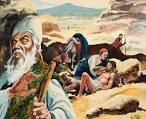
The Parable of the Good Samaritan is an excellent lesson in Godly-Compassion that we must exemplify in our walk with Messiah
The Prushim (aka Pharisees), Sadducees and Scribes were renowned for their cold, callous, pompous, self-righteous and arrogant personas, clearly lacking any compassion towards the people they were leading and discipling. Master told the well-known story of what has been historically referred to as the parable of the “Good Samaritan” found in Luke 10:25-37. We are all familiar with the story: a victim of a mugging is left to die on the road to Jericho. A priest and a Levite were noted to have come upon the victim and failed to offer assistance for whatever reason; possibly due to having such a self-righteous attitude. But it was a Samaritan, whom the Jews viewed as nothing more than “dogs,” that stopped and rendered this poor victim the lifesaving assistance that this, no doubt a Jewish man, required. The sentiment of Jews seeing Samaritans as dogs is linked to the story of Yeshua and the Samaritan Woman at the well, found in Matthew 15:26.
Now, I don’t believe for one minute that Master was actually referring to the Samaritan Woman and her people, as recorded in this Chapter of Matthew, as dogs at all. I believe the tenor of Yeshua’s discourse with this woman was something akin to:
Hey, you and I both know how my people, the Jews, think of you, right? As dogs. Well, my dear, you will see in just a few seconds that I don’t hold such a view of you. It’s those fools who call themselves children of Abraham over in the capital that see you as dogs. And I’m here to show you and the world that they are wrong and those self-righteous bastards that look down upon you are not of my Heavenly Father.
But what we saw in the story of the Good Samaritan was that the Godly trait of compassion transcends any man-made stereotype that exists in the world at any given time. And yes, I believe that compassion is a Godly trait. Throughout Torah, when the scales are not obscuring our view of the true meaning of Yahovah’s Laws and Commandments, we can see compassion interwoven throughout. And it is that trait of compassion that leads all the way up to Yeshua and His chosen Apostles that shines ever so brightly as a beacon: a beacon that we must be drawn to and embrace and exemplify as true Believers in Yahoshua Messiah.
Yeshua Modeled Compassion for Us and We Must Practice Compassion in the World
Compassion. Love. And it is that embracing and display of this trait, not just for those in our immediate biological families and personal circle of friends, that we are compelled to put practice in the world around us. This Godly attribute when possessed and practiced by the true disciples of Yahoshua Messiah separates us from the pretenders and impostors of our Faith. And sadly, compassion is a rare commodity in our Faith -community. But it shouldn’t be. It shouldn’t be because if Yeshua is our life model–the model by which we should be living out our day-to-day walk–then we should be behaving as He did. When He washed His disciples feet, Master said to them:
“For I have given you an example, that ye should do as I have done to you.” (John 13:15, KJV)
Granted, in this verse, Master was specifically speaking to the foot washing example. Nevertheless, the same sentiment must clearly apply to everything that Master did and that was recorded by His Gospel writers. Kefa (aka Peter) wrote in his general epistle,
“Servants, be subject to your masters with all respect, not only to the good and gentle but also to the unjust. For this is a gracious thing, when mindful of Yah, one endures sorrows while suffering unjustly. For what credit is it if, when you sin and are beaten for it, you endure? But if when you do good and suffer for it you endure, this is a gracious thing in the sight of Yahuah. For to this you have been called, because Messiah also suffered for you, leaving you an example, so that you might follow in His steps.” (I Peter 2:18-21, ESV, corrected)
The Story of the Raising of Lazarus-The Prototype for the Godly-Attribute of Compassion
But getting back to the original story that prompted this post in the first place: the story of the raising of Lazarus from the dead. Our Master found Himself in a very unique position. As the story goes, found in John chapter 11, Master was informed by emissaries sent from Miriam and Martha (Lazarus’ sisters) that His dear friend Lazarus was desperately ill. Obviously Master realized right then and there that Lazarus’ illness would ultimately lead to his death (or rather, Lazarus’ temporary death). Yeshua obviously had the power within Himself to swoop in to Bethany and heal Lazarus, just as He had been doing for so many people in the region over the course of His ministry. But Master was led, no doubt by the Ruach Kodesh, to let death take Lazarus. Some might say that this was a cold and calculated thing for Yeshua to have done: that is, to know you have the power within you to prevent a tragedy but you choose to let the thing happen to its worse end for purposes of achieving a greater end and to serve the glory of Abba Father. And that is exactly what Master chose to do: obey the Spirit within Him, allow Lazarus to pass away, and glorify not just Abba Father, but certify Himself as Messiah and His ministry of reconciliation and salvation. Yet if we elect to see this thing from the perspective of Yeshua using human tragedy to achieve a greater end–if we elect to see it from a negative, cold and uncaring perspective such as that–we cheat ourselves out of seeing this miracle for what it ultimately was and meant.
Abba Father, regardless how we rationalize things in this life from our myopic and low-level cognitive perspectives, must always be given and receive the glory (glory=Greek for “doxazo,” which means “to cause dignity and worth of an individual or thing to be manifested and acknowledged.”–Thayer’s Greek Lexicon) And this is the mistake that so many people have made in how they view our Creator: they see Him as some cold and callous and maniacal Being that cares nothing about anything apart from His personal interests. And if you were to compare and contrast man with Yahuah based solely upon a human understanding, of course one would naturally come to such a negative conclusion about the Creator of the Universe. But is that conclusion indeed a true and accurate understanding of who Father is, at least from a human perspective. Of course not. We can never compare Yah to man in any way, form or fashion. Father, through the great prophet Isaiah says of Himself:
“Seek ye Yahovah while He may be found, call ye upon Him while He is near. Let the wicked forsake his way, and the unrighteous man his thoughts: and let him return unto Yahovah and He will have mercy upon Him and to our God, for He will abundantly pardon. ‘FOR MY THOUGHTS ARE NOT YOUR THOUGHTS, NEITHER ARE YOUR WAYS MY WAYS,’ says Yahovah. ‘FOR AS THE HEAVENS ARE HIGHER THAN THE EARTH, SO ARE MY WAYS HIGHER THAN YOUR WAYS AND MY THOUGHTS THAN YOUR THOUGHTS.'” (Isaiah 55:6-9, KJV, corrected)
We can’t tell for certain why Master allowed Lazarus, a man whom the Gospel writer described was dearly loved by Master, to die, apart from the fact that Master had a job to do and that job was to glorify our heavenly Father and glorify Himself as Messiah. If anything, Lazarus’ death and subsequent resurrection would go down in the history of Christiandom as one the great means by which Master’s Messiahship would be certified on this planet.
Yahoshua had a lot on His Mind
We must also be cognizant of all the stuff that Master had to take into consideration in the midst of this pending miracle.
(1) By Master returning to the region, specifically Bethany, being but 2-miles from Yerushalayim, He was placing His life in peril, having survived at least 3-attempts on his life just a few weeks prior–reference John 8–one attempt and John 10–two attempts.
(2) He realized that He would be severely criticized by both Martha and Miriam for allowing their brother to die.
And (3), Messiah could see His mortality looming ahead of Him as He must have realized that His earthly mission was drawing to a close in the weeks ahead of this incident.
So Master had a tremendous burden on His shoulders and His psyche.
We May be Wasting Valuable Time in the Service of the Kingdom of God
I can’t imagine the stress He must have endured during this time. And despite all these hanging issues, the man still had a job to do and He had to do that job within the time frame that Father allotted Him. Unlike us today: many of us feel that we have no worries whatsoever as it relates to our role in the Gospel of the Kingdom. We tend to go about our lives with nary a care or concern. We have no sense of urgency. We lack true direction and purpose. And this is a shame when you really think about it. It’s a shame because we’ve all been given jobs to do; missions to accomplish; purposes to fulfill. Yet most of us simply don’t go about doing those things that we’ve been given by Abba to do.
What if Yeshua had the same mindset and lackadaisical attitude that many of us possess today? Where would we be: lost and poised for eternal destruction? And it is this very thing that often keeps me up at night. I know I have a job to do, beyond producing and posting this program. Yet I know that I’m not doing it those other things that I’m supposed to do. I’m finding excuses why I can’t do what I’m supposed to do now. And that’s bordering on the criminal.
Right now, we have daylight which allows us to work unencumbered. I’m not talking about actual daylight, but freedom to work for the Kingdom unencumbered. Many of us had concerns that if Hilary were to be elected to the highest office of this nation that we’d somehow find ourselves thrust into night and darkness and unable to accomplish that which Father has given each of us to do. But it would appear–and this is only a surmise, a guess if you will–that we’ve been given a reprieve from Yahovah by the election of Mr. Trump. We don’t know for sure. Mr. Trump’s election and subsequent administration could very well turn out to be of no help to us working the fields of the Kingdom. Figuratively speaking, we have 12-hours of daylight right now, as described by Yeshua in verse 9 of John 11 and chapter 9 of John, verse 4, that we must use to get the job done. My fear is that we will rest upon the laurels of a successful Trump victory and allow the time to go by and not accomplish our assigned missions. But having Mr. Trump in office by no means assures us that we won’t be censored or even persecuted and inhibited from doing the work that we have to do.
Already, the powers that be are moving to censor various news outlets that they deem to be putting out “fake news.” Interestingly enough, that which is being deemed as “fake news” is actually “true news” in most cases and that which is deemed to be “true news” is actually “fake news.” Yet that is the way of man and that is one of the things that the Great Prophet Isaiah was dealing with during His ministry–the twisting of good into bad and vice versa. Isaiah wrote:
“Woe unto them that call evil good and good evil; that put darkness for light and light for darkness; that put bitter for sweet and sweet for bitter. Woe unto them that are wise in their own eyes and prudent in their own sight!” (Isaiah 5:20, 21, KJV)
Indeed, this passage seems to suggest that Father does not at all condone such practices and those that practice this form of witchcraft are destined for severe punishment.
Now I don’t pretend to be a person who disseminates news to the public as a primary focus of this ministry. I will from time-to-time reference newsworthy events that I feel have the potential of impacting our Faith-community. But my focus is primarily discussing the Good News of the Gospel of the Kingdom of Yahuah as it relates to our walk with Messiah.
Nevertheless, my point of contention on this issue is that if the powers and principalities of this world are able to put those who call out or point out wrongdoing out of business–essentially convincing the public that these individual who are, in reality good, are instead bad, I fear our demise as operators of the Kingdom of God is not too far off. Most people, even our fundamental Christian cousins, see us Netsarim, Hebrew Rooters and the like, as evil; as heretical; as having fallen from grace. So it won’t be too much of a stretch for us to experience the same demise as those in the truth-media.
Yeshua Showed Obedience to our Purpose is Essential to our Roles in the Kingdom of God
Yet Yeshua remained obedient to His purpose and mission and He allowed Lazarus to die, despite the inherent problems associated with His actions (or lack thereof). So despite these tremendous concerns that were no doubt haunting our Master, He goes to Bethany to deal with the death of Lazarus. Lazarus had by then been dead for some 4-days. According to Rood’s Chronology, this incident took place in the winter, specifically around the time of Purim, which occurs each year in the 12th Biblical Month. So the weather would most likely have been moderate at the time of this story. Regardless, and being a Coroner Investigator by trade, I can tell you, 4-days after death, even in a moderate climate such as we’d see here in this passage, Lazarus’ body would have begun to deteriorate and decompose. The stench that would have emanated from his remains would have been unbearable to those in attendance. His body would have begun to marble (patches of green discoloration developing in various parts of his body); his body would have begun to bloat and develop pockets of fluid. His face would have become blackened and bloated to such a state that He would have been unrecognizable to even his sisters.
So any thought that death could ever be reversed would have been an utterly ridiculous concept in the minds of natural man. But when we’re speaking about and dealing with Yeshua Messiah, we must learn to always look beyond the natural and think and see things from the supernatural. More so, in our walk with Messiah, as sold-out Netsarim and disciples of Master Yahoshua, we have been shown and encouraged to operate in the supernatural realm. It is this mindset and this area of existence that separates us from the vast majority of people on this planet. Yet it is impossible, without the power and influence of the Ruach Kodesh, for most people to even contemplate, much less operate, in the supernatural realm.
Yeshua Operated in the Supernatural Realm and so must We
It is this difficulty of not seeing and understanding the supernatural realm that Miriam and Martha and some of those in attendance with the sisters found themselves experiencing. Realizing from a natural perspective that Lazarus was really really dead, and knowing how the human body changes after death as days go by, those mourning over Lazarus’ death could only rationalize prevention over reversal. In other words, both Miriam and Martha made it a point to remind Yeshua that if He had come when summoned 4-days prior, He would have been able to save their brother Lazarus from death. Prevention. Yet, I don’t think it ever dawned on any of them that Yeshua, operating in the supernatural, would be capable of reversing 4-days worth of death in Lazarus. It just would not have entered into their minds. It’s almost like the world in general not being able to fathom a Donald Trump victory in this country, despite what the mainstream media and the politicians were telling us throughout the entire election season. And when Trump won the election, the world went into complete and utter shock and even to this day, some 4-weeks later, the world is still trying to come to grips with how such an unthinkable thing could have happened.
But it was what transpired next that caught my attention and is the principle focus of this Thoughts and Reflections. Yeshua did not fully come into Bethany or at least He did not go in to the area where Lazarus had been laid to rest. Martha, upon hearing that Master had come to the region, rushed out to meet Him. Of course so much would have been running through Martha’s mind at the time: Why would Master come so late? Why would He allow Lazarus to die? What is He here to do now? Can His presence here somehow lighten our grief? Why did He not come to save my brother? She even gives Master a side lashing of sorts by reminding Him that Lazarus would have survived had Master come when she and her sister had originally sent word of Lazarus’ condition a few days prior. Despite her pointless frustrations at this point, Martha showed that she still had some of her faith intact, although I’m pretty sure she had no idea of what Yahoshua had in mind to do about this somber situation. Martha said:
“Even now I know that whatever You ask of Yah, Yah will give You.” (Verse 22)
Master obviously was touched by this simple display of faith and responded warmly:
“Your brother will rise again.” (Verse 23)
And of course Martha lets Master know that she was well aware that her brother would be part of the great future resurrection and it was here that I believe Martha’s natural mindset overshadowed her ability to reason and see into what could be or better, see into the supernatural. Martha then leaves Master and runs over to her home and retrieves her sister Miriam who hastens to meet Master herself. And the record suggests that Miriam’s response upon meeting up with Master, still at this point a distance away from Lazarus’ tomb, was similar to Martha’s:
“Master, if You had been here, my brother would not have died.”
Do you detect some slight sense of resentment, but with a greater degree of respect and reverence? Isn’t that how we are with Father from time to time?
“Why haven’t you done so and so for me? Why are you allowing this bad thing to happen to me? What else can go wrong? Why me? Why me? Woe is me?”
And it was here in the story that Miriam began to weep, falling down at the Master’s feet.
And it was at this pivotal point in the story that the humanity of Master Yeshua shined ever so brightly for the entire world to see. Verse 33 and 35 read:
“When Yeshua saw her weeping and the mourners which came with her also weeping, He groaned (or as other translations express it, He was deeply moved) in the spirit, and was troubled…Yeshua wept.” (Rood Chronology)
The 100% Humanity of Master Yahoshua Revealed
Thus it is here that we see undeniable evidence, in my opinion, that Master was 100% man. He was 100% man, but so much more. Not a God-Man as Churchianity would have us believe–but the archetypal man that each of us, especially us men in the Faith, should aspire to be in every way possible. He was not afraid to cry and show His emotions in public. And His display of compassion was not a contrived form of compassion and grief. It came from the core of His being.
I used to think that Master’s weeping here was over Lazarus’ death. But it would appear from this verse that Master had an emotional response to the grief that Miriam and some of her co-mourners were displaying in response to this hopeless situation.
Why Understanding the Humanity of Yeshua is so Important for Netsarim to Understand
Why do I think this is so important to understand? I think it is important for us as Netsarim to understand the Master’s humanity and the compassion He had and continues to have towards the human condition because it is one of the things that drove Him to complete His mission of reconciliation. And unless we operate from that same place–a sense of humanity and compassion and love towards all men and the human condition, I believe we can not fulfill our individual assigned missions.
You see, Master was always looking outwards and upwards. And when we do the same–when we look outwards and upwards and we resist looking inward (as hasatan attempted to get Yeshua to do in the wilderness temptation incident as recorded in Matthew 4, Mark 1 and Luke 4), then we start transforming into the splitting image of our older brother and Master Yahoshua. That’s the only way we can accomplish this thing. And for some reason, when many of us come into Hebrew Roots, like a thick winter coat upon coming in from the cold outside, into a warm and cozy home, we hang our humanity–our love–our compassion–we hang it on the coat rack that is our inner selves and we go about our personal affairs; never feeling; never loving; never being like the Master of our Salvation.
Oh, but what about Torah brother? We must obey Torah first and foremost. Well, that’s where I think most of us miss the boat. The Torah is all about love, caring and compassion. This is evident in that great passage of Matthew chapter 22 which reads:
“Then one of them, which was a lawyer asked Him a question, tempting Him and saying: ‘Master, which is the great commandment in the law?’ Yeshua said unto him, ‘Thou shalt love Yahovah thy Elohim with all thy heart, and with all thy soul and with all thy mind. This is the first and great commandment. And the second is like unto it: (here it is–here it is) thou shalt love thy neighbor as thyself. For on these two commandments hang all the law and the prophets.'” (verses 35-40, KJV, corrected)
Yeshua came to us as a 100% man who possessed all the attributes of any human man, absent the sin nature. Could He have sinned if He wanted to? Absolutely, contrary to the teaching of many in funamental Christianity. Otherwise, He would not fit Father’s requirements for a true sacrifice to be rendered on behalf of mankind.
Master also possessed all the personal attributes of His Father Yahuah: steadfastness, unpretentious love; unconditional love; love of the truth; disdain for evil; love of peace;compassion; hope; and so much more. But I don’t believe Master was Yahuah Himself. And I’m going to get deeper into this subject in future Thoughts and Reflections as the Ruach leads.
Faithfully submitted by Rod Thomas, your friend and brother in the True Faith once delivered.
Music: DanOMusic–“The Experiment”
Note: I will often use the 3-most popular names used by Hebrew Rooters for the Creator interchangeably: Yahuah; Yahovah; and Yahweh. I will also from time-to-time referred to our Creator as Abba or Abba Father or Yah.
Israel’s Inextricable Link with our Salvation Part 1
This is "Israel's Inextricable Link to our Salvation Part 1." Back on 10/13/2023, I posted a teaching and discussion entitled Ministry Update and My Thoughts and Reflections on Hamas' Invasion of Israel. In the Hamas' Invasion of Israel portion of the post I expressed...
Are God’s People Required to Wear Tzitzit Today and is the Wearing of Them a Salvific Issue?
This is “Are God’s People Required to Wear Tzitzits Today and Is the Wearing of Tzitzits a Salvific Issue?” And just to cut to the chase, beloved, the answer to both questions is yes. I’ll explain why in just a few. Why Discuss Tzitzit Wearing? The reason I was led to...
Invitation to Messianic Discipleship-From the Sinner’s Prayer to True Messianic Discipleship
Welcome to The Messianic Torah Observer. Maybe you’ve been here before and have more questions about our ministry or the Messianic, Hebrew Roots, or Nazarene Israelite faith. And if that’s the case, I’m happy you’re here and I’m happy to answer questions you may have...
The Deep Abiding Mysteries of the Aaronic Blessing-My Thoughts and Reflections of Torah Reading 104
Greetings and Salutations Greetings, Saints of the Most High. This Rod coming to you from the DFW, thanking you for taking the time from your busy schedules to fellowship with me on this glorious Shabbat. As always, I hope, trust, and pray that this installment...
TMTO Ministry Update and My Thoughts and Reflections on Hamas’ Invasion of Israel
There are two things I wish to cover in this installment of TMTO. The first will be an update on this ministry: What's happening and what's ahead. Secondly, I want to share my thoughts and reflections on the terrible, tragic, horrific, heinous events that transpired...
Ten Things God Expects us to do for Sukkot-The Feast of Tabernacles 2023
In today's installment, I will be putting out to you what I have elected to call ten things Yehovah says in His Word that every Netsari, disciple of Yeshua Messiah, must do for Sukkot/Tabernacles. Now, some of you will be acutely aware of many of these things...
The Variegated Shadows of Yom Kippur 2023—Or When Payback is a Bear for the Enemies of God and His Set Apart People
Yom Kippur, the Holiest Day of Yah's Calendar Year Yom haKippurim is considered by many in our Faith and orthodox Judaism as the holiest day of Yah's biblical calendar year. On this holiest of days, Yah mandated His chosen ones to "afflict their...
Thoughts and Reflections on Yom Teruah-The Feast of Tabernacles 2023
This is a special TMTO post that I pray will encourage, and maybe inform you, as it relates to the imminent advent of Yom Teruah, or the Day of the Blowing of Trumpets. As you may, or may not know, we are on the very cusp of receiving this Moedim, this...
The Realities of the Messianic’s Liberty in Messiah–Thoughts and Reflections of Torah Reading 95
These are my thoughts and reflections on the 95th parashah of the 3-year Torah Reading cycle. It is contained in Leviticus/Vayiqra 25:39-26:2. I’ve entitled this discussion: The Realities of the Messianic's Liberty in Messiah--Thoughts and Reflections on Torah Reading...
TMTO Ministry Update
Greetings I'm back! Well, not quite. But almost. History of Ministry QFC (2012) Blog (2012) Podcast (2014-11/2022) YouTube (2018-11/2022) QFC Affiliates with Feastkeepers (New York) and First Century COG (Baltimore) (2019-2021) Why we ended the podcast...

